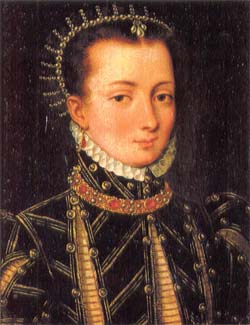A reader asked why I honor Anne Boleyn, so I thought I’d elaborate a little on that, and on the concept of the Mighty Dead.
As all of you are probably aware, ancestor worship plays a major role in many pagan religions, and is especially prominent in Heathenry. However, since some people have become estranged from their immediate ancestors and are uncomfortable with the idea of honoring them for a number of reasons, and others (me included) were adopted and thus don’t know as much about our biological families as we would like, the concept of “adopted ancestors” has become an increasingly popular one. Somewhat related to this is the idea of the “Mighty Dead”: actual or adopted ancestors who were somehow bigger than life, whose name and deeds live on widely after their deaths, and whose values and personal qualities inspire us and epitomize the qualities we’d like to bring out in ourselves. Many Heathens number figures such as King Penda—an Anglo-Saxon warrior king who fought fiercely against the spread of Christianity—among their own Mighty Dead. Others—such as a seidhr practitioner like me—might well honor Thorbjorg, the seidhrkona described in the Saga of Erik the Red.
However, although pagans are more likely to choose pagan heroes to honor as Mighty Dead, there is no reason to dismiss Christian figures out of hand; sometimes a person—living or dead–has such outstanding personal qualities that their specific religion becomes a secondary consideration. Anne Boleyn, for example, was a leading light of the Protestant Reformation and undeniably a Christian Queen, yet she was also a tireless advocate for literacy, one of the very first to insist that the Bible should be available in English for the English people to read. She also epitomized qualities such as strength, cunning, boldness, passion, poise, and grace in adversity that I find valuable in my own life and have cultivated partly through her example.
How does one go about honoring the Mighty Dead? First, just as you would with any god or spirit you would like to honor, ask them how they’d like to be honored or remembered, be open to their suggestions, and then act on them. Typically, you might be asked to set aside a place in your home either for a group of ancestors or one in particular; Anne will get her own little area, ultimately, with jewelry and other items I either make for her or that I think she would have liked. You don’t need a big, elaborate set-up, just a small space set aside and dedicated to them, with items either that belonged to them or that they would like (often they will tell you exactly what to include, if you listen) and a candle and incense holder, with a bowl or glass for offerings. Food offerings should be things that they have either requested, that they enjoyed during life, or possibly—if you don’t have enough information to know what they liked to eat—you could offer things that would have been eaten in their culture by people of their status at that time; for example, enough is known about food in the Tudor era that I should be able to prepare a small feast for Anne quite easily on her day. Other possible ways to honor ancestors or the Mighty Dead include assembling devotional playlists for them (including both things they might like and pieces that remind you of them or their lives), writing or creating artwork in their honor, dressing in a way that pleases them (for Anne’s day, I will be wearing a head covering, as all women did in her time), and–if appropriate–supporting causes they cared about during life. Since Anne will be getting an entire festival in her honor, I will very likely also spend some time on that day either reading about her, watching depictions of her in movies or TV shows (such as The Tudors and The Other Boleyn Girl), or both.
Since my approach to religion in general is one of service, not bargaining (in other words, I honor the gods and spirits in my life out of love, for their own sake, not for what I think they can give me), I’m not expecting to get anything out of honoring Queen Anne other than perhaps a feeling of greater closeness with her, and an acknowledgement of the kinship I already feel with her. The principle of Gebo (a gift invites a gift) being what it is, it is entirely possible that I will receive some guidance or possibly even assistance from her at some point, if she is pleased by my attention; who knows? However, that is not my goal, and should never be a goal or factor in devotional practice. (The tendency of some pagans to see the gods and spirits as spiritual vending machines dispensing favors is its own separate rant, and my friend Dver just posted on that very topic.)
